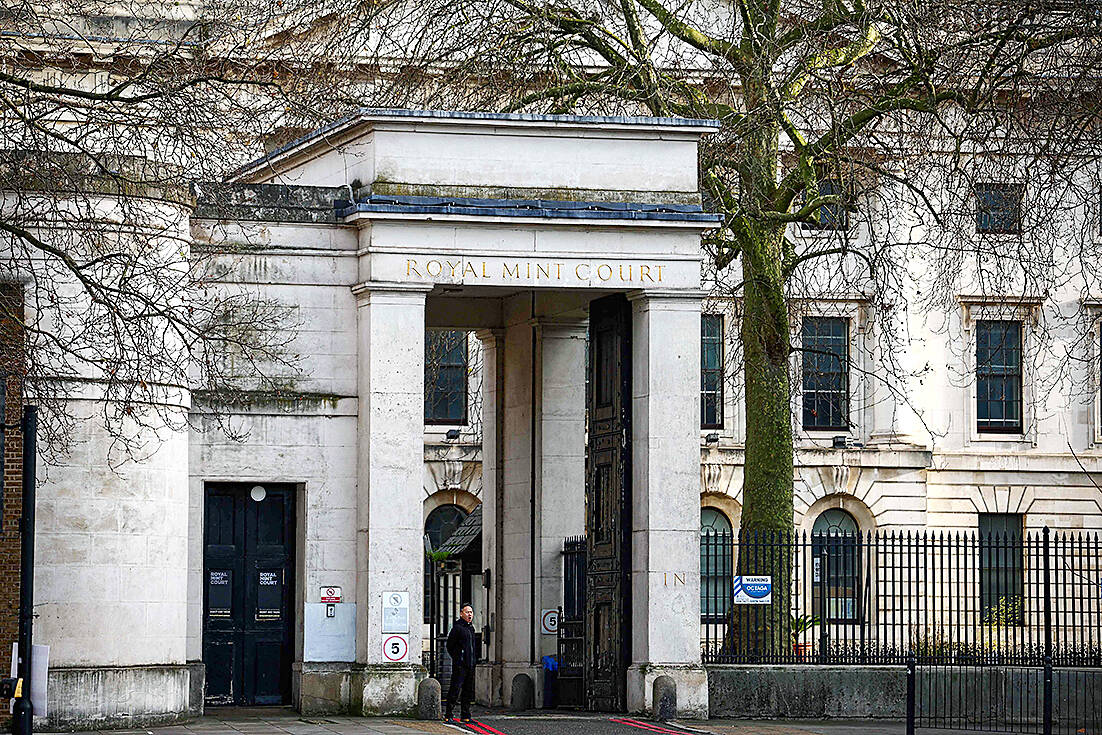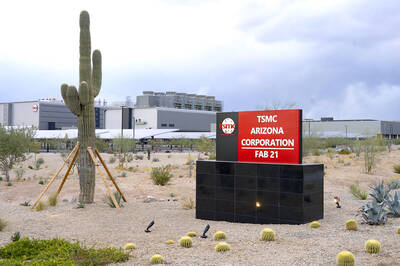As Britain’s new Labor government bids to reset long-fraught ties with China amid a suspected spy scandal, another issue could mar relations: Beijing’s controversial plans to open the largest embassy in the UK. China has for several years been trying to relocate its embassy, currently in the British capital’s upmarket Marylebone district, to a sprawling historic site in the shadow of the Tower of London.
The move east to the complex opposite the UNESCO World Heritage site housing the Tower, and adjacent to the iconic Tower Bridge, has sparked fierce opposition from nearby residents, rights groups, China-hawks and others.
Already rejected by local officials, it now appears to be a key issue in bilateral ties, and featured in early talks between President Xi Jinping (習近平) and Prime Minister Keir Starmer. It comes amid a new row over allegations of suspected spying by a Chinese businessman with links to Prince Andrew.

Photo: AFP
The British leader, elected in July, wants more engagement with Beijing, following years of deteriorating relations over various issues, in particular China’s rights crackdown in Hong Kong.
Last month Starmer became the first UK prime minister since 2018 to meet Xi, when the pair held talks at the G20 in Brazil. With TV cameras rolling, he said that Xi had raised the embassy in an earlier call and reassured him that his government had “taken action” by “calling in” its embassy application.
The decision means a national planning inspector will now hold a public inquiry into the scheme, but Communities Secretary Angela Rayner will make the final decision.
Governments can “call in” developments on various grounds, including issues going beyond “local importance” and impacting other governments or national security.
‘SHOCKED’
Despite Starmer also telling Xi that “we have to follow the legal process and timeline,” the intervention has unnerved opponents of the new embassy.
“I was a bit shocked,” said exiled Hong Kong dissident Simon Cheng (鄭文傑), who lives near the proposed embassy.
“I knew that China’s... plans would be quite important [in bilateral relations]. I hadn’t ever thought that it would be escalated to the top level.”
He worries Starmer’s emphasis on economic growth, and improved China ties, could trump other considerations.
A former British consulate staffer in Hong Kong granted UK asylum after allegedly being tortured by Chinese secret police, Cheng also fears “massive surveillance” at the new site. Housing the Royal Mint — the official maker of British coins — for nearly two centuries, it was earlier home to a 1348-built Cistercian abbey but is currently derelict.
Beijing bought the site for a reported US$327 million in 2018.
It comprises several “listed buildings” of historical note, and before the government’s intervention, any changes had required permission from the local authority, Tower Hamlets Council.
In 2022 its councilors unanimously rejected China’s plans, which include designs by the renowned David Chipperfield Architects firm. In July, Beijing resubmitted the proposals almost entirely unchanged. Conservative councilor Peter Golds has been a persistent opponent.
“Can you imagine the French or the Italians permitting the most famous World Heritage site in their country to have a gigantic embassy next to it? And not just any embassy!” he said.
“It’s a prestige site... it’d be a bit like us going to the Forbidden City,” he added, referring to Beijing’s imperial palace complex. “What an insult!”
‘OVERPOWERING’
The site adjoins a housing complex, and residents are most concerned about security implications.
“A small explosion from a car or a van would cause devastation,” Dave Lake, who leads a residents’ association fighting the plans, said, voicing concerns that the embassy could become a focus of anti-China protests.
Residents recently began fundraising to pay for the legal representation now needed to maintain what Lake considers a David-versus-Goliath battle.
“It’s overpowering — it’s almost as if they’re stamping on you,” he said.
There are reports Beijing intends to link the issue with British plans to redevelop its embassy and ambassador’s residence there.
A Chinese embassy statement said “host countries have the international obligation to support and facilitate the building of the premises of diplomatic missions.”
It added approval would help promote “friendship between the Chinese and British people and the development of bilateral relations.”
James Jennion, associate fellow at the British Foreign Policy Group, said it was “clearly a priority” for China, noting embassies are “status symbols.”
He added the government “calling in” the application “made this more of a ‘bilateral issue’ as well as likely creating future “domestic headaches.”
“This will make it tougher to assess based on practical factors, and will certainly be a defining feature of UK-China relations until a decision is made.”

Taiwanese chip-making giant Taiwan Semiconductor Manufacturing Co (TSMC) plans to invest a whopping US$100 billion in the US, after US President Donald Trump threatened to slap tariffs on overseas-made chips. TSMC is the world’s biggest maker of the critical technology that has become the lifeblood of the global economy. This week’s announcement takes the total amount TSMC has pledged to invest in the US to US$165 billion, which the company says is the “largest single foreign direct investment in US history.” It follows Trump’s accusations that Taiwan stole the US chip industry and his threats to impose tariffs of up to 100 percent

On a hillside overlooking Taichung are the remains of a village that never was. Half-formed houses abandoned by investors are slowly succumbing to the elements. Empty, save for the occasional explorer. Taiwan is full of these places. Factories, malls, hospitals, amusement parks, breweries, housing — all facing an unplanned but inevitable obsolescence. Urbex, short for urban exploration, is the practice of exploring and often photographing abandoned and derelict buildings. Many urban explorers choose not to disclose the locations of the sites, as a way of preserving the structures and preventing vandalism or looting. For artist and professor at NTNU and Taipei

March 10 to March 16 Although it failed to become popular, March of the Black Cats (烏貓進行曲) was the first Taiwanese record to have “pop song” printed on the label. Released in March 1929 under Eagle Records, a subsidiary of the Japanese-owned Columbia Records, the Hoklo (commonly known as Taiwanese) lyrics followed the traditional seven characters per verse of Taiwanese opera, but the instrumentation was Western, performed by Eagle’s in-house orchestra. The singer was entertainer Chiu-chan (秋蟾). In fact, a cover of a Xiamen folk song by Chiu-chan released around the same time, Plum Widow Missing Her Husband (雪梅思君), enjoyed more

Last week Elbridge Colby, US President Donald Trump’s nominee for under secretary of defense for policy, a key advisory position, said in his Senate confirmation hearing that Taiwan defense spending should be 10 percent of GDP “at least something in that ballpark, really focused on their defense.” He added: “So we need to properly incentivize them.” Much commentary focused on the 10 percent figure, and rightly so. Colby is not wrong in one respect — Taiwan does need to spend more. But the steady escalation in the proportion of GDP from 3 percent to 5 percent to 10 percent that advocates